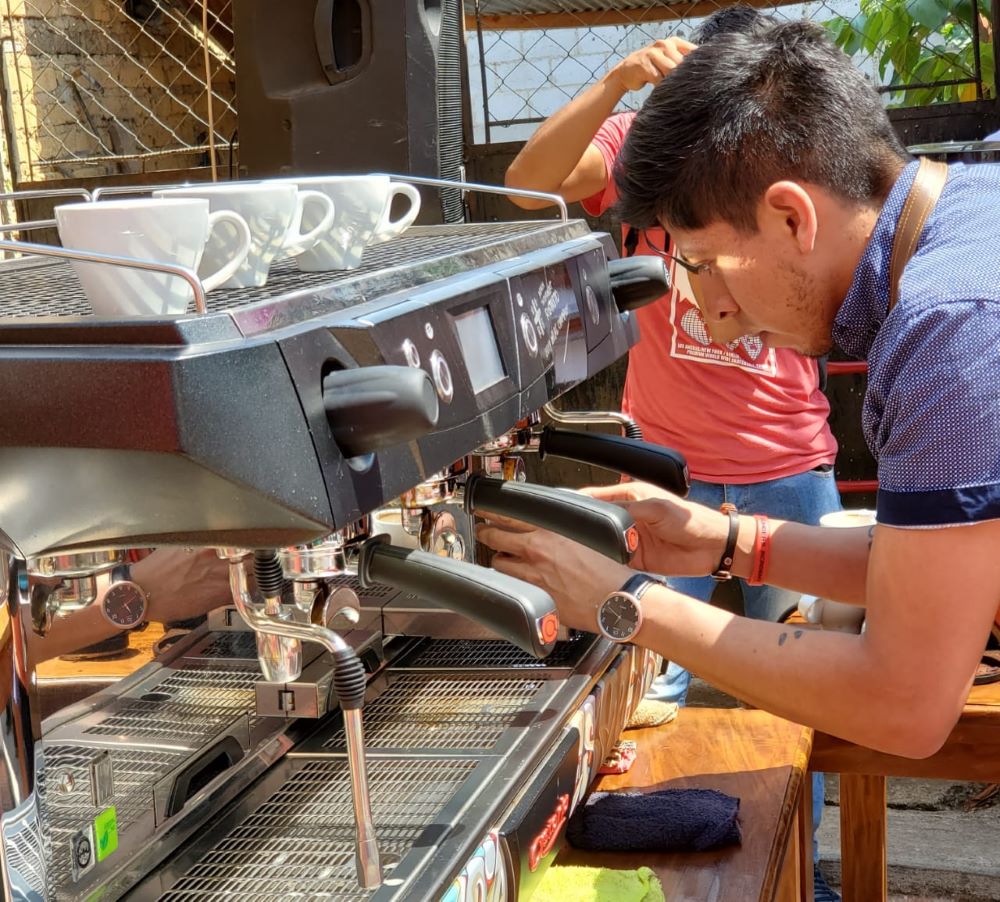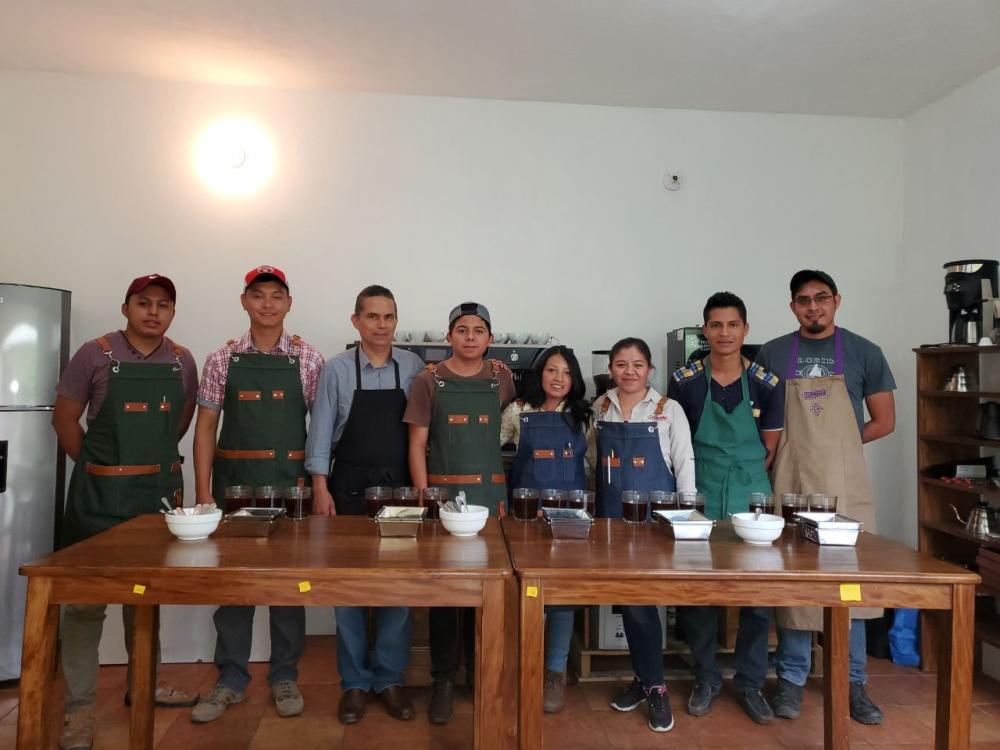In San Antonio Huista, Guatemala, a youth cooperative is working to modernize the ancestral practices that hamper the production and commercialization of their crops, while teaching more and more people to appreciate great-tasting coffee.

Guatemala City, 24 June 2020 (IICA). – In the lush coffee farming region of San Antonio Huista, a paradox persisted: producers were consuming low-quality coffee because they were selling their best crops.
However, things began to change a few years ago, when a group of young people from coffee-farming families in that region of northern Guatemala decided that it was time to modernize the ancestral practices that hampered the production and commercialization of their crops, while encouraging people in their country to develop a taste for top-quality coffee.
“This all began with a group of six friends and work colleagues. We met up to discuss the problems we were facing in the Huista region, where farming practices were very outdated. We decided to begin implementing the latest market trends, to figure out what coffee roasters were looking for, to look for better markets and implement better marketing practices” explained 28-year-old José López, one of the founders of the cooperative.
At present, Vi Café has 27 members between the ages of 24 and 33, seven of whom are women. Like José, many of them hold degrees in agronomy and marketing.
“We promote our services and help farmers from the Huista region to determine the quality of their coffee, the improvements they need to make and where they can sell their coffee, based on the samples they provide us with”.
“We teach producers that quality is affected when good agronomic and post-harvesting practices are not implemented. Those who have made the changes we have suggested have increased their production and improved the quality of their coffee”, José added.
In Guatemala, this silent, urgent revolution of coffee farming practices is driven by the National Coffee Association (Anacafé) with support from PROCAGICA, a program implemented by the European Union and IICA.
A total of 125,000 Guatemalan producers and their families depend directly on coffee farming. According to Anacafé, a private entity that provides public services and represents the country’s coffee sector, more than 122,000 of those farmers produce in small areas.
As part of its initiatives to foster changes, Vi Café organized the Huist Kapeh (“coffee from Huista”, in the jacalteca language) festival in April 2019. The highlight of the festival, which was attended by around 400 people, was a specialty coffee competition. Awards were given to the 13 producers with the highest scores, who were able to sell their products for up to 1,500 quetzales (USD 195) per quintal of pergamino (green coffee with a paper-like membrane that has not been removed), which is well above the average of 600 quetzales (USD 78).
A barista competition was also carried out, with the participation of representatives from 14 departments of Guatemala. Additionally, a tasting laboratory funded by the National Fund for the Reactivation and Modernization of Farming Activities (FONAGRO) was inaugurated.
The laboratory serves as a hub for overseeing the quality of coffee harvested by the region’s small-scale producer organizations, to broaden their access to markets that offer better prices for specialty coffee.
“The laboratory and quality control workshops we offer are important because they teach producers to appreciate coffee and better manage their production and storage processes”, explained Roxana Montejo, a 26-year-old agricultural engineer and current president of the cooperative.
“When training producers, we promote specialty coffees, emphasize aspects such as humidity, and explain the relationship between taste and profit”, she added.

The laboratory helps producers from the Huista region to assess the quality of the coffee they produce, as well as identify the improvements they can make to the complex production process, in order to produce coffee that can be sold at a higher price.
The arrival of the coronavirus
Vi Café was ready to hold its second festival when the coronavirus outbreak forced Guatemalan authorities to implement quarantine measures.
“The activity was cancelled because of the coronavirus, but we sent out all of the information and samples to buyers. Some of them decided not to purchase any coffee due to transportation issues, given that some municipalities, like Jacaltenango, had completely closed off their roads. Producers in some villages could not go out and sell their coffee for the same reason, yet they were still able to sell some of their batches at good prices”, remarked José López.
The mandatory lockdown in Guatemala also led to the closure of the Vi Café coffee shop, which the cooperative had recently opened with support from PROCAGICA.
“In our region, people are used to consuming the worst coffee to sell their best coffee. Cafeterias don’t usually sell coffee, and if they do, it’s not high-quality coffee”, Montejo explained.
“That is where the work carried out by the laboratory and the coffee shop come in. In that regard, PROCAGICA’s support could not have come at a better time. We know that people from different backgrounds like coffee that has been prepared in various ways”, the cooperative member stated.
According to López, the EU, IICA and PROCAGICA have also contributed furniture and accessories for the coffee shop, as well as fertilizers, seedlings and lemon, banana and avocado plants, among other inputs.
The entities have also provided funding for training workshops to assist the region’s farmers in improving their production practices.
Harold Gamboa, General Coordinator of PROCAGICA, noted that one of the structural problems that characterize coffee production in the region, as identified by the program, is the generational divide.
“An aging population of coffee farmers and the lack of involvement by youth in this activity, as well as their limited integration into producer networks and organizations, is a common concern”, he stated.
For this reason, Gamboa explained, the program is working together with groups of producers, local academic institutions, technical training centers and higher education institutions to provide training and assistance programs that would enable younger generations to become involved in and take on tasks related to farm management, value adding, technical assistance and support in implementing entrepreneurial projects.
“Vi Café is a clear example of local entrepreneurship fostered by a group of young visionaries who are eager to change and improve the way things are done within the coffee industry in their region”, remarked Gamboa.
In light of the new circumstances brought on by Covid-19, Vi Café is considering the possibility of providing home delivery for its beverages, in an effort to meet the store’s objective of teaching producers and consumers how to prepare a high-quality beverage.
For now, Vi Café’s members will wait for the pandemic to pass, so that they can return to their passion with renewed energy.
More information:
Institutional Communication Division
comunicacion.institucional@iica.int











